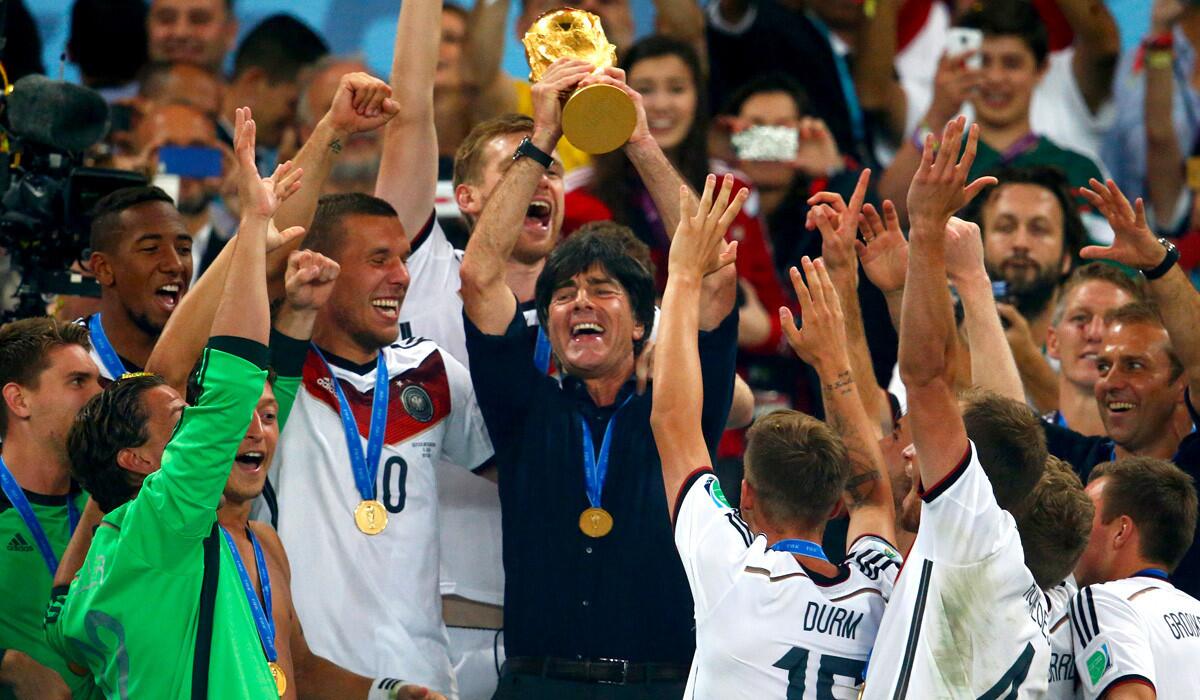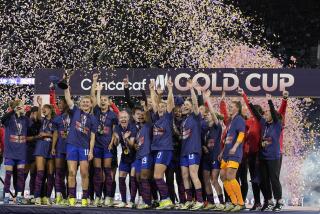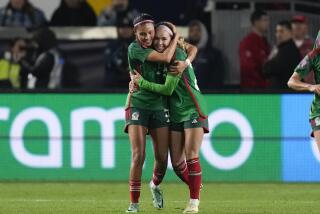World Cup: Germany takes note of Juergen Klinsmann’s contributions

U.S. Coach Juergen Klinsmann wasn’t with the German team in person when it won the World Cup on Sunday. But he was certainly there in spirit and influence.
That’s because it was Klinsmann, as coach of the national team, who began the overhaul that led to Sunday’s win over Argentina. And it was Klinsmann’s hand-picked successor, Joachim Loew, who coached the team to that victory.
So Loew made sure Klinsmann’s contributions were noted Sunday.
“In 2004, German football was down. We took decisive steps,” he said. “We said, ‘We have to invest more in the education so we are technically better. Just having the German virtue is not enough.’”
Many of Klinsmann’s moves were controversial and unpopular at the time, although his methods were proved right when he got Germany to the semifinals of the 2006 World Cup.
After the tournament he turned the team over to Loew, who led Germany to the semifinals in 2010 before winning the title this summer, tying the country with Italy for the second-most World Cup titles with four.
Brazil, with five crowns, holds the record.
“We’ve been together for 55 days, [but] we started this project 10 years ago and this is the result of that work, beginning with Juergen Klinsmann,” Loew said. “Though the years, we were able to increase our performances and make progress. We believed it.”
Klinsmann was equally quick to congratulate his friend on Twitter.
“YES YES YES!!! JOGI YOU DID IT!!!,” he wrote in all caps. “HUGE COMPLIMENT TO ARGENTINA, BUT THE BEST TEAM WON THE 2014 WORLD CUP!”
A tarnished Golden Ball
Lionel Messi took home one prize Sunday, but it wasn’t the one he wanted.
After losing the World Cup final, the Argentine captain climbed a long concrete stairway to a viewing platform to accept the Golden Ball, which goes to the tournament’s best player.
It’s unlikely few winners have looked as glum while accepting so prestigious an award. But for Messi, winning an individual award while losing the World Cup only furthers the perception that he is an extraordinary gifted player who can’t win the big one.
His coach, Alejandro Sabella, said that criticism is unwarranted.
“He was there before. He has been there for quite a while, in the pantheon of the big ones,” Sabella said.
And, Sabella added, Messi should not look at the Golden Ball as a consolation prize because it’s an honor he earned.
“He played an extraordinary World Cup,” Sabella said. “He was a fundamental factor in the team in where we are today.”
Other World Cup awards went to German keeper Manuel Neuer, who won the Golden Glove as the tournament’s best goalie, and Colombia’s James Rodriguez, who won the Golden Boot by leading the tournament in scoring with six goals.
Golden goal
Mario Goetze’s World Cup-winning score in overtime was the 171st — and final — goal of this World Cup, tying the record for most goals, set in 1998 in France. That works out to an average of 2.67 goals in the tournament’s 64 games.
Attendance for the 64 games was estimated at 3.43 million, making it the second-best-attended World Cup behind only the 1994 tournament in the U.S., which drew 3.6 million spectators.
Among those in attendance Sunday were eight heads of state, including Russian President Vladimir Putin; actors Ashton Kutcher and Daniel Craig; models Gisele Bundchen and Adriana Lima; and singers Placido Domingo, Shakira and Wyclef Jean.
Oh, and there was one king: LeBron James, newest member of the Cleveland Cavaliers.







